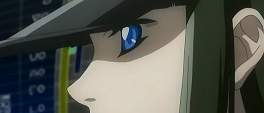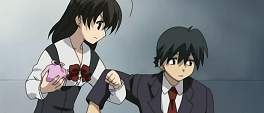



It would be easy to be confused as to just where exactly Blue Drop sits in terms of genre if one went by the first three episodes: perhaps the all-girl school histrionics would give some indication, but juxtaposed with operatic science fiction it would seem that maybe the series is trying to tell a different, as yet, hidden story touching on old Gundam favourites such as the horrors of war or its effect on children. Blue Drop actually occupies the secret third option and the hint lies in the source manga's genre: yuri.
The quiet, fringe-afflicted girl shows up in an entirely out-of-place outfit consisting of a leotard crossed with navy regalia
This divulgence is able to put a lot of the introductory material into context, and while it certainly doesn't contain anything near the raunchy material of the manga, Blue Drop still seems uncertain as to who the series is aimed at. The character design is less than stellar, it seems that clichés are born and bred in the school the central characters attend and the animation does nothing to compensate for this, instead the aesthetics feel washed out and less than enticing. Development is restricted to the protagonist only, and the revelation that her nemesis is captain of a futuristic underwater craft comes across as more underwhelming than it was perhaps meant to. So with the interpersonal relationships and sexual content that series should have inherited from its parent missing, and the other typical trappings of the yuri genre absent, the question of what exactly the series offers becomes difficult to answer.
Read the rest of this entry




Words seem almost inadequate when trying to convey the wistful nostalgia evoked by 5 centimeters per second. Every scene in the petite one hour movie is visually arresting, the sparse dialogue secondary to the unspoken emotion loaded into each moment; it is beautiful, moving and amazingly personal film. Separated into three chronologically sequential stories, the film follows Takaki Tohno and his relationship with childhood friend Akari Shinohara.
each sky, each train car, each snow swept vista is beauteous and beyond the capabilities of real life to produce
The first story, Oukashou, comprises Takaki's fraught train journey to see Akari after they were separated due to parental employment. Occupying the bulk of the movie's timeline, the subtext of distance and solitude will be instantly familiar to anyone who has seen Makoto Shinkai's previous works: Voice of a Distant Start (Hoshi no Koe) and The Place Promised in our Early Days (Kumo no Mukou, Yakusoku no Basho). Even in such a short time-frame, Takaki's journey is sentimental and emotive, cutting straight to his fears and expectations unconcerned with exterior bravado. Scene by scene, poise and grace is established by valuing silence as much as dialogue and the ever present melody of the piano. The first story culminates in a serene landscape of snow and darkness before Takaki heads home in the fresh morning sunlight, starting the narrative cycle once more with the second and then third stories.
Read the rest of this entry




I'm sure like many others I was enthralled by the story that the final episode of School Days had been indefinitely postponed due to a supposedly violent ending and its likeness to a real-world killing. Not one to pass up on controversy, I queued up the series expecting it to be a fluffy, real-world version of Shuffle! or perhaps akin to Kimi ga Nozomu Eien; what I didn't expect was an unflinching, overly-dramatic portrayal of the depths of teenage decrepitude.
the series' H-game roots are only evident in the amount of sexual deviance present
The first episode of this petite twelve episode series is as mediocre and clichéd as I expected: introverted loner Makoto takes a liking to a girl he sees on the train, female best friend tries to help him get together with her while secretly having the warm-and-fuzzies for him herself. Rolling my eyes and switching off my sensibilities I began to place bets on the most promising axe-wielding female: perhaps the fun-size, silent one is actually a dark-horse in all of this. It took less than half the series to convince me that ending with violence is just one of the punches that School Days will deliver.
Read the rest of this entry











